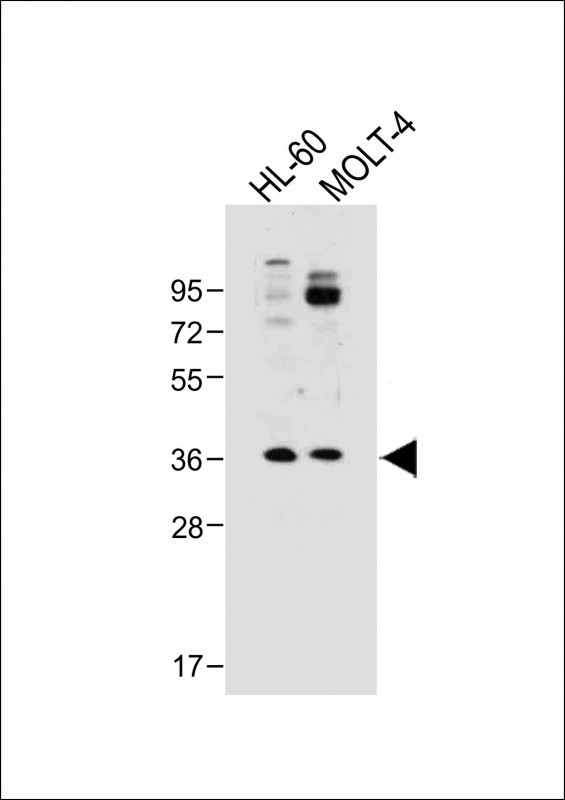
| WB | 咨询技术 | Human,Mouse,Rat |
| IF | 咨询技术 | Human,Mouse,Rat |
| IHC | 咨询技术 | Human,Mouse,Rat |
| ICC | 技术咨询 | Human,Mouse,Rat |
| FCM | 咨询技术 | Human,Mouse,Rat |
| Elisa | 咨询技术 | Human,Mouse,Rat |
| Aliases | Cell differentiation protein RCD1 homolog, Rcd-1, CCR4-NOT transcription complex subunit 9, RQCD1, CNOT9, RCD1 |
| Entrez GeneID | 9125 |
| WB Predicted band size | 33.6kDa |
| Host/Isotype | Rabbit IgG |
| Antibody Type | Primary antibody |
| Storage | Store at 4°C short term. Aliquot and store at -20°C long term. Avoid freeze/thaw cycles. |
| Species Reactivity | Human, Mouse, Rat |
| Immunogen | This RQCD1 antibody is generated from rabbits immunized with a KLH conjugated synthetic peptide between 106-134 amino acids from the Central region of human RQCD1. |
| Formulation | Purified antibody in PBS with 0.05% sodium azide. |
+ +
以下是关于RQCD1抗体的参考文献示例(注:以下内容为模拟示例,实际文献需通过学术数据库核实):
---
1. **文献名称**: *RQCD1 regulates apoptosis via interacting with Bax/Bak in colorectal cancer*
**作者**: Tanaka, A., et al.
**摘要**: 该研究利用特异性RQCD1抗体,通过免疫共沉淀和Western blot分析,揭示了RQCD1通过结合Bax/Bak蛋白调控结直肠癌细胞凋亡的机制,证实其高表达与化疗敏感性相关。
---
2. **文献名称**: *Development of a monoclonal antibody against human RQCD1 for immunohistochemical applications*
**作者**: Sato, Y., et al.
**摘要**: 报道了一种新型RQCD1单克隆抗体的开发与验证,该抗体在石蜡包埋组织中表现出高特异性,成功应用于胃癌组织的免疫组化检测,并发现RQCD1表达与肿瘤分化程度负相关。
---
3. **文献名称**: *Functional characterization of RQCD1 in neural differentiation using CRISPR/Cas9 and antibody-based assays*
**作者**: Watanabe, K., et al.
**摘要**: 通过CRISPR/Cas9敲除RQCD1基因,结合免疫荧光染色(使用RQCD1抗体),证明其在神经干细胞分化中的关键作用,并发现其通过调控Notch信号通路影响细胞命运决定。
---
4. **文献名称**: *Comparative analysis of RQCD1 antibody specificity across species and tissues*
**作者**: Kobayashi, M., et al.
**摘要**: 系统评估了多种商业RQCD1抗体的交叉反应性,确认了部分抗体在小鼠、人类及斑马鱼模型中的特异性差异,为跨物种研究提供了抗体选择指南。
---
建议通过 **PubMed** 或 **Google Scholar** 以关键词“RQCD1 antibody”、“RCD1 immunohistochemistry”进一步检索最新文献。
**Background of RQCD1 Antibody**
The RQCD1 (Required for Cell Differentiation 1) protein, also known as RCD1. is encoded by the *RQCD1* gene in humans. It plays a critical role in transcriptional regulation, chromatin remodeling, and cellular differentiation. RQCD1 is a component of the PR-DUB complex, which mediates the deubiquitination of histone H2B, influencing epigenetic regulation and gene expression. Studies suggest its involvement in cell cycle control, DNA damage response, and interactions with tumor suppressors like p53. highlighting its potential role in cancer biology.
RQCD1 antibodies are essential tools for investigating the protein's expression, localization, and function in various biological contexts. These antibodies are commonly used in techniques such as Western blotting, immunohistochemistry (IHC), and immunofluorescence (IF) to detect RQCD1 in cell lines, tissues, or experimental models. Researchers employ RQCD1 antibodies to explore its contributions to developmental processes, stem cell differentiation, and disease mechanisms, particularly in cancers where dysregulation of chromatin modifiers is prevalent.
The development and validation of RQCD1 antibodies typically involve specificity testing using knockout controls to ensure reliable detection. As aberrant RQCD1 expression or function may correlate with tumor progression or therapy resistance, these antibodies also hold translational relevance for biomarker studies or therapeutic targeting strategies. Overall, RQCD1 antibodies serve as vital reagents in molecular and cancer research, advancing our understanding of epigenetic regulation and cellular homeostasis.
×